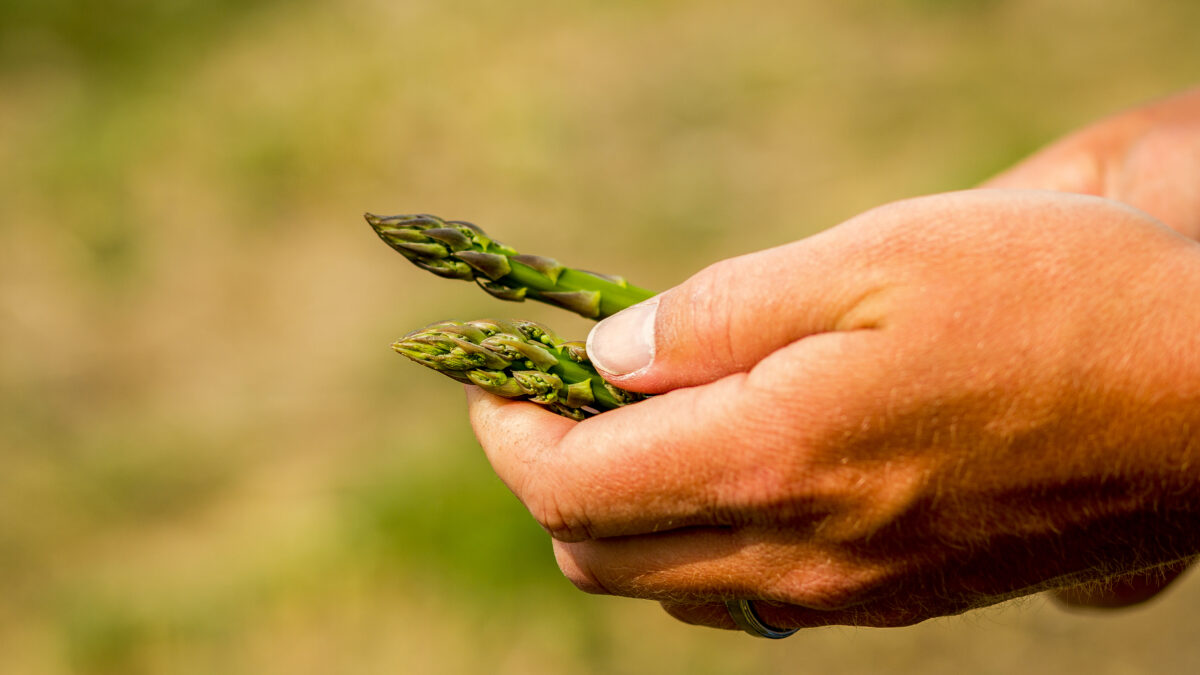The Clock is Ticking for Specialty Crop Growers
Caleb Herrygers

photo credit: Michigan Farm Bureau, Used with Permission
My family’s fourth-generation farm has been growing asparagus in West Michigan for decades, but that could soon be changing.
Simply put, there are too many hurdles that block my path to growing this nutritious crop efficiently and sustainably.
The two largest hurdles are surging foreign imports from Mexico and Peru, and disastrous U.S. labor policies. These problems have led many of my neighbors – as well as other farmers across the nation – to stop growing specialty crops, which include fruits, vegetables and nuts, and some other commodities not covered under current farm safety net programs.
First, foreign competitors in the fresh fruit and vegetable sector have slowly encroached on our domestic markets, squeezing out U.S. farmers. The U.S. imports 60% of our fresh fruit and 40% of our fresh vegetables and the numbers are climbing. My family farm simply cannot continue to grow asparagus without relief from the market pressures of underpriced, subsidized imported asparagus being sold in our own backyard. Enhancements to U.S. trade law, or other stopgap remedies, must be advanced.
Without changes, consumers won’t have the choice to buy fresh, locally grown produce.
On top of that, recent changes requiring payment of non-farm wages to farm employees are taking a devastating toll on my family’s livelihood.
We employ around 70 guestworkers through the H-2A visa program to pick asparagus in the spring. We rely on these workers and appreciate them. Frankly, we couldn’t farm without them in light of the labor shortage. But the red tape and unrealistic requirements our government has wrapped around the program are forcing many of us to reconsider using it, which forces a more consequential assessment of how we can continue farming.
A federal wage formula called the Adverse Effect Wage Rate sets mandatory wages and is sending them sky high on a year-over-year basis. Our finances just can’t keep up with that. I expect to pay an additional $75,000 in labor costs in 2024. That’s after a 15% increase in 2023… and another sizable one in 2022.
In fact, compared to just eight years ago, our farm is paying an additional $400,000 for the same hourly labor. Other farmers across the country are also facing dramatic increases in labor costs. That’s just not sustainable.
Labor costs have skyrocketed, while fresh asparagus revenues have been stagnant or decreased during this same period, even before accounting for inflation. We cannot raise prices to account for the increased cost and decreased margins because of the import pressure.
It’s worth noting that the recent change to federal rules is just one of eight rulemakings in the last 18 months to directly affect agricultural employers. We’re facing an avalanche of unclear government mandates and red tape.
The reality farmers are facing is that the federal government has the tools and capabilities to alleviate these problems confronting the U.S. specialty crops sector, but nothing has been done.
It is heartening that the farm bill is strengthening its track record on specialty crop needs, as highlighted in a 2023 columnby Jon Iverson, a specialty crop farmer in Oregon.
The research dollars, grant funding and export marketing programs within the bill have been vital to developing better resilience to the unique pressures faced by our sector nationwide. Even USDA is exploring ways to improve existing programs within their current authority. But these programs must be legislatively bolstered, and new funding sources must be considered. Now, with a one-year extension of the farm bill, Congress has the additional time it needs to forge policy solutions long past due.
But these problems cannot be effectively addressed if staked on the farm bill alone.
Congressional action is also needed to modernize our agricultural workforce and support our farmers against unfair trade practices. Without it, U.S. farm families who have relied on fruit and vegetable production to put food on their own tables – and tables across the country – will be forced to consider abandoning this tradition altogether.
As we enter the new year, I hope we can resolve as a nation to preserve two traditions in particular: protecting the farm family and sustaining domestic food production as a core national security strategy. Why national security? Because if a country can’t feed itself, it isn’t secure. Remember the panic we saw over empty grocery store shelves during the COVID-19 pandemic? Thank goodness that was temporary.
Here’s the bottom line: without changes, consumers won’t have the choice to buy fresh, locally grown produce — and instead will be forced to rely solely on imported options for their family meals.
There are many opportunities for Congress to improve this situation. I encourage them to act before it’s too late.
Caleb Herrygers is a Farm Bureau member and asparagus grower in Michigan.
Trending Topics
VIEW ALL